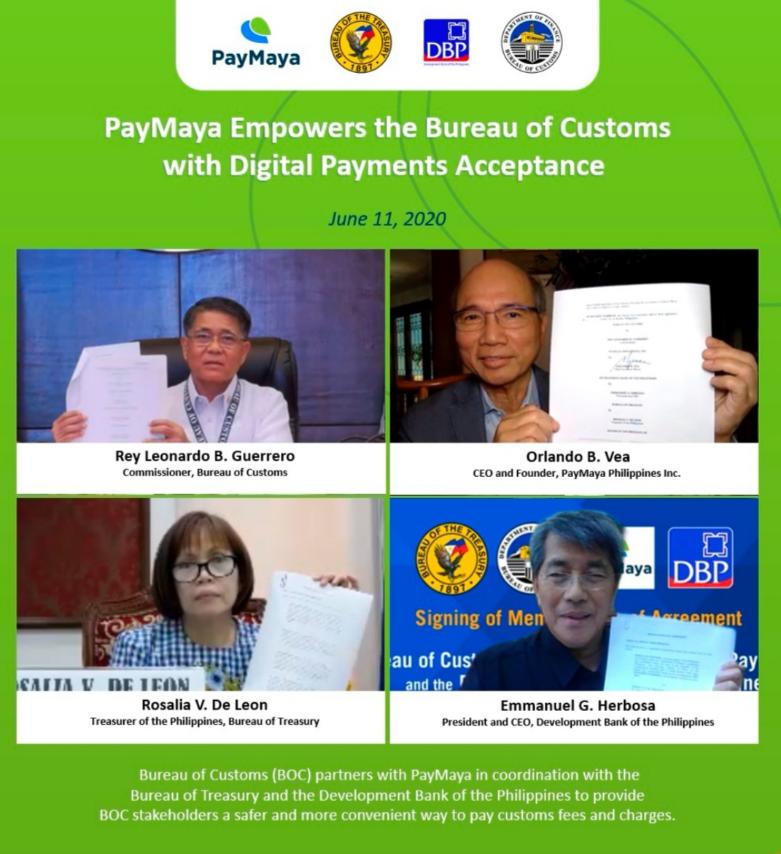
The Bureau of Customs (BOC) on June 26 will start implementation of its online payment system for the collection of Customs fees and charges.
BOC last June 11 signed a memorandum of agreement (MOA) with the Bureau of the Treasury (BTr), Development Bank of the Philippines (DBP), and online payment service provider PayMaya Philippines, Inc. for the implementation of the online payment system.
READ: BOC to implement online system for payment of customs fees
Under the MOA, PayMaya will accept from BOC client payments of miscellaneous fees and charges–other than customs duties and taxes–through PayMaya’s Payment Solutions (PPS). PPS services include Online Checkout that accepts credit/debit cards for local and cross-border payments, Bills Payment via PayMaya app, Pay by PayMaya, PayMaya One POS (point-of-sale) terminal that accepts credit/debit cards and PayMaya QR payments, and Smart Padala Centers Bills Payment.
The MOA covers payment of client service fees specified under the agreement, as well as the arrangement of depositing the collected BOC fees and other payments to the DBP.
To pay fees and charges through PayMaya, the client may indicate his preference for online payment in BOC’s Customer Care Portal (https://client.customs.gov.ph/). The client would then receive the invoice through their email address. The invoice will show the fees or charges due and the corresponding amount. The client should then click on “Pay”. Once all relevant cardholder information is provided, the client should click “Complete Order”.
The client may opt to save the card for future use before confirming payment. Once confirmed, the payment will be processed for 2-3 seconds. After payment processing, the client will receive the transaction status. Clients can choose to give their email address or SMS number to receive the transaction receipt.
BOC noted this new development is in compliance with Republic Act (RA) No. 11032 (Ease of Doing Business and Efficient Government Services Delivery Act of 2018), which mandates all offices and agencies of the government are mandated to improve transaction systems and procedures, as well as RA 8792, also known as the E-Commerce Act of 2000.
BOC said it ensures the public that it will continue to adopt measures necessary to facilitate and minimize disruption to the supply chain amid the coronavirus disease (COVID-19) pandemic.
BOC assistant commissioner and spokesperson Atty. Vincent Philip Maronilla in an earlier online update said the customs bureau “will no longer shift to a manual system and we will maintain the online systems already.”
Maronilla said BOC discourages face-to-face transactions and is gearing towards online transactions not just protect to the health and safety of Customs employees and stakeholders, but also to “protect the integrity of the entire process” of the customs bureau.
BOC last May said it will implement more information and communications technology (ICT) projects that will speed up trade facilitation, strengthen border security, and protect government revenues in response to the “new normal” brought by the COVID-19 pandemic.
These systems include the online payment of customs fees such as processing fee for registration of importers and customs brokers, online inventory management system for off-dock container yard/container freight stations, online inventory management system for customs bonded warehouses, a passenger customs clearance system at Ninoy Aquino International Airport, Electronic Tracking of Containerized Cargo, and the continuous stabilization of its Electronic-to-Mobile (e2m) system.
The P5.5-billion Philippines Customs Modernization Project proposed by the World Bank was also recently approved by the National Economic and Development Authority Board. The project seeks to improve efficiency of Customs and reduce trade costs.





